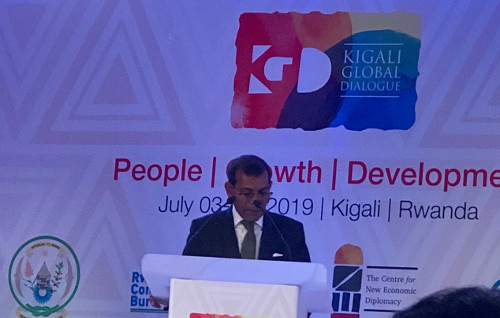I attended the 25th Anniversary of Liberation Day in Kigali on July 4, 2019, commemorating the end of the genocide. The contrast between “then” and today was extraordinary.

Parade commemorating the 25th Anniversary of Liberation Day
in Kigali on July 4, 2019.
Rwanda has made progress since 1994 toward attaining many Sustainable Development Goals (SDGs). Some drivers of change are:
During the Kigali Global Dialogue held July 3-5 that straddled Liberation Day, many of these issues were discussed from a Rwandan and broader African and Indian perspective. For example, we learned about the development of Kigali Innovation City to galvanize scientific progress. Speakers provided tangible examples of how the increased engagement of women in high-level policy settings affects what is discussed and how issues are addressed. Societal needs and those closely related to SDGs get high priority.

One of the most compelling speeches was by the Former President of the Maldives, Mohamed Nasheed. His speech on ending climate change carried the same urgency and focus Rwanda is achieving more broadly. He outlined many features of a desired and needed coal-free era that I believe have implications for a smoke-free world, including:
Nasheed also stressed the importance of supporting the likely “losers” in the energy change process – coal miners. For tobacco control, the analogous losers are tobacco farmers, especially individuals in poor rural communities of Africa and Asia where smallholder women farmers are common. The demand for tobacco is decreasing and will affect already vulnerable populations. The tobacco farmers know this and so do their governments. Increased support for ways to transition smallholder tobacco farmers to alternative livelihoods makes both economic and ethical sense.
These discussions took place 25 years after the genocide ended in Rwanda. Back then, the future looked bleak. Today, what was deemed unthinkable, is happening. The economy is thriving. Women are in many leadership positions. Science, technology, innovation, and entrepreneurship are activating and exciting young people.
These ingredients apply to what is needed to transform the tobacco industry. But such transformation starts with a clear vision of what is possible and desirable – something still missing among the legacy leadership of global tobacco control.
© 2023 Foundation for a Smoke-Free World. All rights reserved.